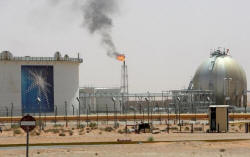|
Exclusive: Saudis
threaten to raise oil output again as sparring with Iran
returns
 Send a link to a friend
Send a link to a friend
 [November 04, 2016]
By Rania El Gamal and Alex Lawler [November 04, 2016]
By Rania El Gamal and Alex Lawler
DUBAI/LONDON
(Reuters) - Old disputes between Saudi Arabia and rival Iran resurfaced
at a meeting of OPEC experts last week, with Riyadh threatening to raise
oil output steeply to bring prices down if Tehran refuses to limit its
supply, OPEC sources say.
Clashes between the two OPEC heavyweights, which are fighting proxy wars
in Syria and Yemen, have become frequent in recent years.
Tensions subsided, however, in recent months after Saudi Arabia agreed
to support a global oil supply limiting pact, thus raising the prospect
that OPEC would take steps to boost oil prices.
But a meeting of OPEC experts last week, designed to work out details of
cuts for the next OPEC ministerial gathering on Nov. 30, saw Saudis and
Iranian clashing again, according to four OPEC sources who were present
at the meeting and spoke to Reuters on condition of anonymity.
"The Saudis have threatened to raise their production to 11 million
barrels per day and even 12 million bpd, bringing oil prices down, and
to withdraw from the meeting," one OPEC source who attended the meeting
told Reuters.
OPEC headquarters declined to comment on discussions during the
closed-door meetings last week. Saudi and Iranian OPEC delegates also
declined official comments.

Saudi Arabia has increased output since 2014 to record highs of around
10.5 million-10.7 million barrels per day and adding extra supply would
only worsen the global glut, which has already seen prices more than
halving from $115 a barrel since mid 2014.
The Saudi threat followed objections by Iran, which said it was
unwilling to freeze its output, the same OPEC sources said. Iran has
argued it should be exempt from such limits as its production recovers
after the lifting of EU sanctions.
The Saudi threat will revive memories of a pump war that Riyadh embarked
on at the end of 2014 to claw market share back from higher-cost
producers. Iran along with other OPEC price hawks have severely
criticized the Saudi strategy.
Riyadh has softened its stance since the appointment of Khalid al-Falih
as energy minister in May this year.
In September, OPEC agreed at a meeting in Algeria on modest preliminary
oil output cuts in the first such deal since 2008, with special
conditions given to Libya, Nigeria and Iran, whose output has been hit
by wars and sanctions.
A new rise in tensions observed during the meeting of experts last week
highlights the fragile nature of OPEC agreements. The group has a long
way to go before it turns its preliminary Algerian accord into a real
deal.
The Saudi threat to raise output came as a surprise even to Riyadh's
Gulf OPEC allies, sources who attended the meeting of experts on Oct. 28
said.
One source said the Saudi OPEC delegation has asked to call off the next
day's meeting with non-OPEC producers, including Russia, on Oct. 29
since Iran was objecting to a deal. But they were convinced by other
members to attend it in order not to embarrass the group.
"We felt as if they (the Saudis) wanted the meeting to fail," said a
third, non-Iranian OPEC source.
[to top of second column] |

A gas flame is seen in the desert near the Khurais oilfield, Saudi
Arabia June 23, 2008. REUTERS/Ali Jarekji/File Photo

"WAR FRONT"
The Saudi OPEC delegation told their Iranian counterparts that Tehran
should freeze output at 3.66 million bpd - the latest estimates of
Iranian output by OPEC experts, known as secondary sources.
Iran has reported its output at 3.85 million bpd in September and said
it would only cap its output at 12.7 percent of OPEC's total ceiling -
or 4.2 million bpd.
Iran's counter-argument at the meeting was that Saudi Arabia has raised
its output by almost 1 million bpd since 2014, and is now trying to
convince others it would cut output by 400,000 bpd to get a deal, though
in reality Riyadh has already won extra production and revenue,
according to OPEC sources.
Iranian comments after meeting to domestic media indicated tensions were
high.
"Working in oil industry is like operating at war fronts and we have to
preserve our trenches by raising our production capacity as much as we
can," Ali Kardor, managing director of the National Iranian Oil Company
(NIOC), told the oil ministry's news agency Shana.
"The next OPEC meeting is near and we will never cease to recapture our
quota in the organization," he said on Monday, adding that Iran's crude
oil output was nearing 4 million bpd.
OPEC sources have said Saudi Arabia offered to reduce its output from
summer peaks of 10.7 million bpd to about 10.2 million if Iran agreed to
freeze production at around levels of 3.6 million-3.7 million bpd.
The Saturday meeting with non-OPEC producers went ahead though they made
no specific commitment.
The High Level Committee of experts will meet again in Vienna on Nov. 25
to finalize the details ahead of the next meeting of OPEC ministers on
Nov. 30.
OPEC Secretary-General Mohammed Barkindo has said he is "optimistic" a
final agreement will be reached.

An OPEC delegate, who attended Friday's meeting, said he still hoped for
a deal in November.
"People can look at it from different angles. The fact that discussions
are still going on is a positive one. They are going to work on it,
close to the ministers’ meeting," the delegate said.
(Writing by Dmitry Zhdannikov, Editing by Angus MacSwan)
[© 2016 Thomson Reuters. All rights
reserved.] Copyright 2016 Reuters. All rights reserved. This material may not be published,
broadcast, rewritten or redistributed. |